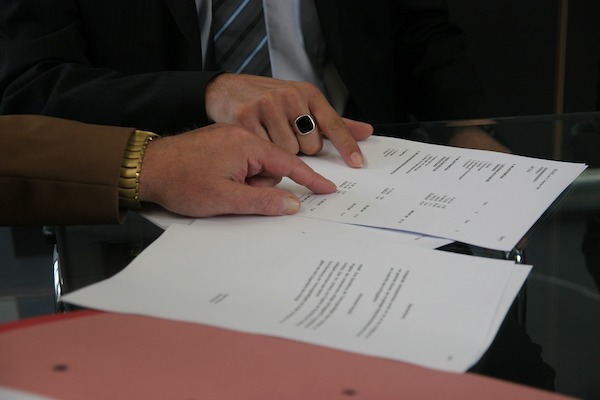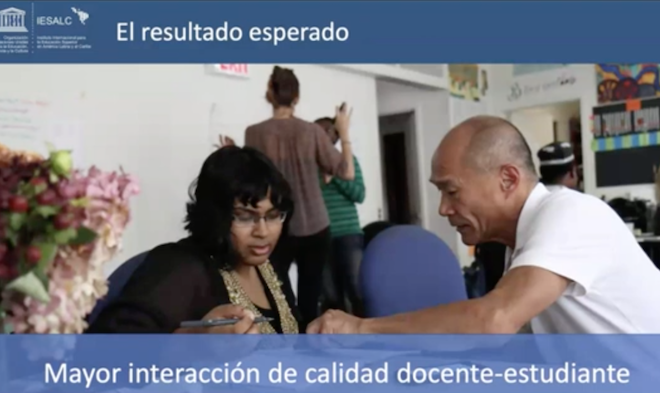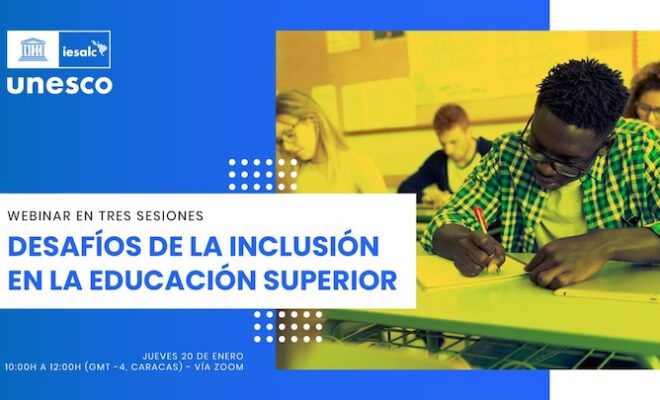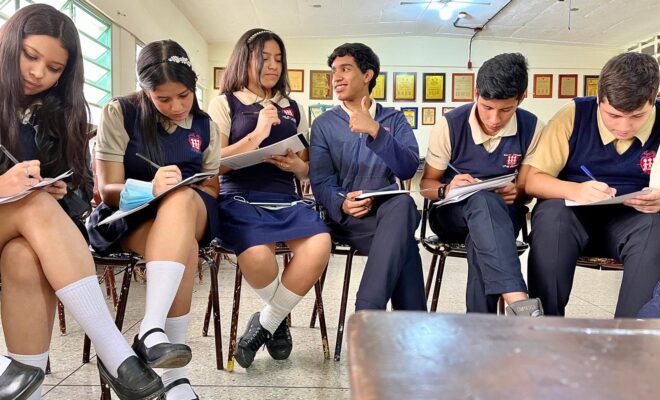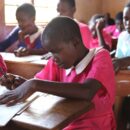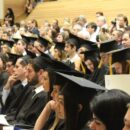UNESCO presented in Barcelona the 3rd World Higher Education Conference: “Reinventing Higher Education for a Sustainable Future”
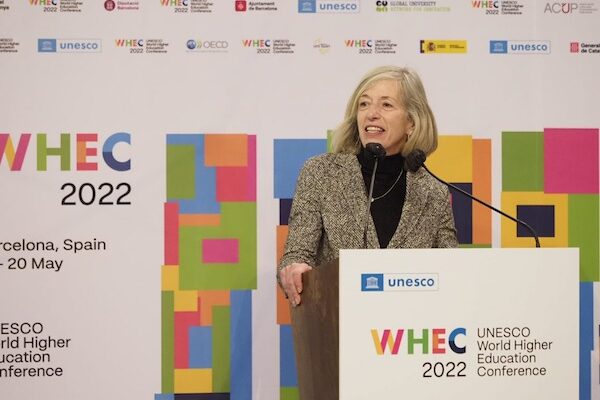
What impact has the COVID-19 pandemic had on higher education? How to guarantee an inclusive higher education with relevant and quality programs? How can academic mobility be promoted globally? How can higher education institutions contribute to the achievement of the 2030 Agenda and the Sustainable Development Goals? These and other topics will focus the work of the 3rd World Higher Education Conference (WHEC2022) to be held in Barcelona (Spain), from May 18 to 20, 2022, under the title “Reinventing Higher Education for a Sustainable Future”.
Presented on November 29, 2021 at the Paranymph of the Historical Building of the University of Barcelona (UB) in an event organized by UNESCO, the Spanish government, the Government of Catalonia, the Barcelona Provincial Council, the Barcelona City Council and the Catalan Association of Public Universities (ACUP), since it holds the presidency and technical secretariat of the Global University Network for innovation (GUNi), the event seeks to contribute to the improvement of organizations and higher education systems under the approach of Human Rights and the 2030 Agenda for development sustainable and its promise to leave no one behind.
The 10 main themes of the conference are: the impact of COVID-19 on higher education, Higher Education and the Sustainable Development Goals (SDGs), inclusion, program quality and relevance, academic mobility, governance, financing, data and knowledge production, international cooperation and the futures of higher education.
The members of the Technical Expert Groups (TEGs) of the Conference have been working on the 10 base documents on each of the themes, which seek to articulate theory and practice, as well as to provide references for policy dialogue and inputs to the roadmap for higher education.
They have also developed online focus groups for consultation, with the participation of experts and the public linked to the area. The TGEs have received support from specialists from UNESCO and UNESCO IESALC, who collaborate in technical and operational tasks.
On the occasion of the launch of the presentation of the #WHEC2022, the experts met to finalize the details of this event, which will be a milestone for education in the coming decades. IESALC contributed to the preparation of the background document corresponding to theme 9 of the Conference on International Cooperation to Boost Synergies. It was presented by the Director of IESALC, Dr. Francesc Pedró, who pointed out the most important aspects of current international cooperation in higher education.
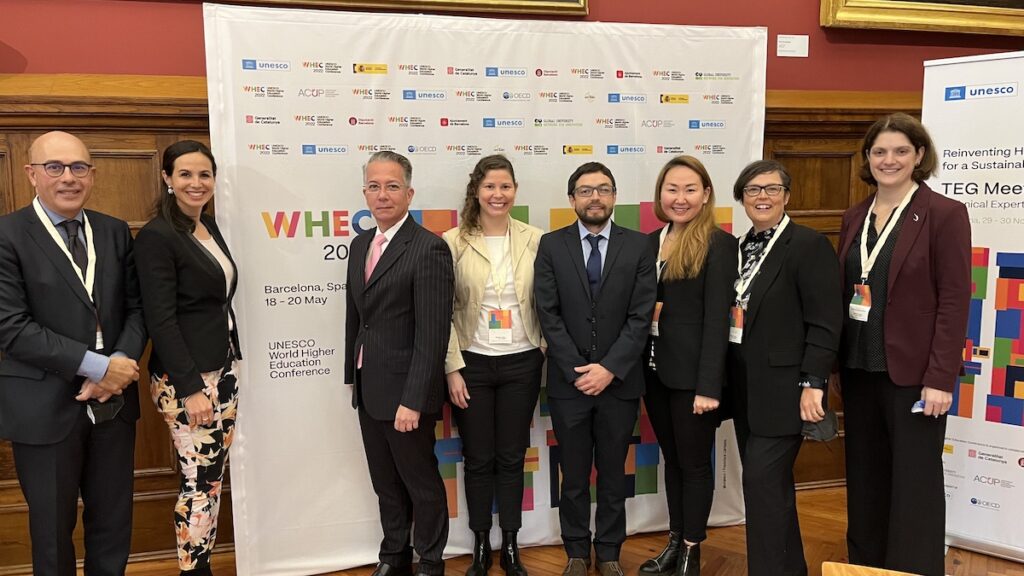
Photo: IESALC participates and actively contributes to the preparation of WHEC2022 (from left to right): Francesc Pedró, Director; Victoria Galán, Senior Policy Analyst; José Antonio Quinteiro, Programs Coordinator; Eglis Chacón, Junior Policy Analyst; Harold Mera, Junior Policy Analyst; Dana Abdrasheva, Fellow; Neus Pasamonte, Executive Assistant; Emma Sabzalieva, Senior Policy Analyst
After outlining the taxonomy of international cooperation, Pedró explained the main reasons that motivate donors and beneficiaries to engage in international cooperation: exchange of experiences and ideas, access to complementary resources, increased efficiency and cost reduction, increased capacity and reputation, joining forces to be more representative and helping other organizations in less developed countries. Eventually, cooperation is important to promote peace, humanitarianism and in the search for solutions to social problems, although it can also respond to colonial, economic and commercial interests.
Pedró said that 193 countries participating in the last UNESCO General Conference approved the first international framework for an open science, which will allow new advances in international cooperation, as well as open learning resources (OERs), twenty years after being promoted by UNESCO and which, together with massive open online courses (MOOCs), constitute important tools for creating open learning spaces that favor international cooperation.
Finally, Pedró said that a growing number of higher education institutions (HEIs) are incorporating the SDGs in the design of their university social responsibility strategies, and that international cooperation must operate from a principle of solidarity.
Likewise, IESALC contributes with the review and descriptive analysis of some aspects inherent to higher education, including the future of higher education and international cooperation.
The conference launch event
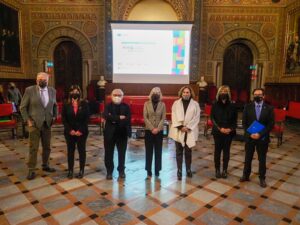
Photo (from left to right) Javier Lafuente, Global University Network for innovation (GUNi); Gemma Geis, Government of Catalonia; Manuel Castells, Minister of Universities of the Government of Spain; Stefania Giannini, UNESCO Assistant Director General for Education; Ada Colau, Municipality of Barcelona; Núria Marín, Barcelona Provincial Council; Joan Guàrdia, Rector of the University of Barcelona
The Rector of the University of Barcelona (UB), Joan Guàrdia, has welcomed the attendees to the event, declaring that “initiatives like this are fundamental for the future of the planet, which will be built from global cities like Barcelona. Not in vain, dedicate space and talent to discuss how to improve Higher Education is an optimal investment for the future where universities are and will be a meeting place for all aspects of knowledge. A diverse world implies a tolerant and inclusive world, and this implies a simple word: Education.”
“It is an honour for Spain to host this Conference at this crucial moment to promote global dialogue on higher education, a dialogue to which all voices are invited and from which ideas and commitments will emerge that will mark the university life of the next generations of students.”, declared the Minister of Universities of the Government of Spain, Manuel Castells.
“What it is about is to redesign the higher education agenda for the next ten years, writing a new roadmap that makes it an inclusive and diverse place that better responds to the needs of development and the current labour market” stated Stefania Giannini, UNESCO Assistant Director General for Education.
The event, presented by Josep M. Vilalta, GUNi Director, was also attended by representatives of the Catalan public institutions that are part of the Local Coordination Desk of the Conference, constituted by the Government of Catalonia; represented today by Gemma Geis, Minister for Research and Universities of the Government of Catalonia; the Barcelona Provincial Council, represented by its President Núria Marín; and the Municipality of Barcelona, represented by the Mayor Ada Colau.
Gemma Geis, Minister for Research and Universities of the Government of Catalonia, declared that “universities must contribute to improving local competitiveness and making a fairer society possible. Interaction between cities, universities and companies is essential”. Núria Marín, president of the Barcelona Provincial Council, added that “as a representative of the 311 municipalities served by the Barcelona Provincial Council, I value the organization of the third UNESCO World Conference on Higher Education as an important recognition in our territory. A recognition of the long and pioneering pedagogical tradition that characterizes us”. “Barcelona is a city of education and knowledge, where universities represent a central element of social, cultural and economic progress. That is why we are proud to host the third World Conference on Higher Education and to be able to contribute to the promotion of the debate on the future of the university at a global level”, declared Ada Colau, Mayor de Barcelona.
The WHEC2022 Conference aims to break with the traditional models of higher education and open the doors to new innovative, creative, and visionary conceptions that not only serve current sustainable development agendas, but also pave the way for future learning communities that exceed the barriers, speak to everyone and be inclusive with all learners throughout life.
The event will give voice to all actors in academic life, including professors, researchers, administrators, entrepreneurs, young people, political leaders, and social leaders. The conference will also include a variety of side events, informal meetings, and exhibitions (technology, innovation, good practices, art, science, culture) to expand learning and exchange opportunities for all participants.
The International Science Council (ISC), the International Association of Universities (IAU) are among the partners of the Conference, as well as the Organization for Economic Cooperation and Development (OECD) or the UNITWIN Program and UNESCO Chairs.
Latin America and the Caribbean preparation consultation
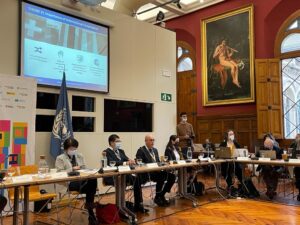
Francesc Pedró presented theme 9 of the Conference on International Cooperation to Boost Synergies
As part of the previous events, UNESCO-IESALC is carrying out a specific consultation for Latin America and the Caribbean, which will gather the voices of the different stakeholders related to higher education on the key issues of the conference.
For the development of the consultation, webinars are being developed, from October 2021 to February 2022, whose themes will revolve around the ten main points that will be addressed at the World Conference. Each of these webinars is composed of a presentation by an expert on the topic and one panel with representatives of the government sector and with the main associated stakeholders in higher education.
How can you participate?
– Register for the webinars we have prepared around the ten priority themes of the conference.
– Send us your feedback and/or share your experience on any of these topics in our public consultation.
– Organize your own events on some of the priority themes – contact us to find out how!
Photo: “What it is about is to redesign the higher education agenda for the next ten years”, said Stefania Giannini, Assistant Director-General for Education at UNESCO
RELATED ITEMS
